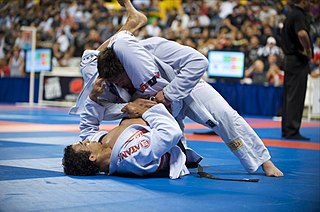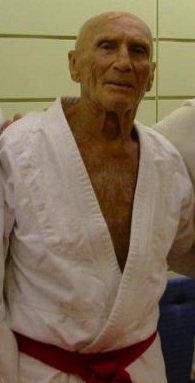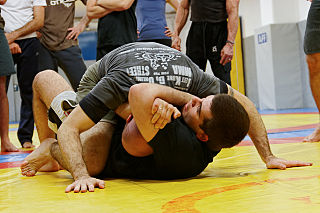Related Research Articles

Brazilian jiu-jitsu, often abbreviated to BJJ, is a self-defense martial art and combat sport based on grappling, ground fighting, and submission holds. It is primarily a ground-based fighting style and focuses on taking one's opponent down to the ground, gaining a dominant position, and using a number of techniques to force them into submission via joint locks, chokeholds, or compression locks.

Marco Antônio de Lima Ruas is a Brazilian former mixed martial arts fighter, submission wrestler, kickboxer and instructor. Ruas was the UFC 7 Tournament Champion, and also competed for the World Vale Tudo Championship (WVC), PRIDE Fighting Championships and the International Fight League, where he head-coached the Southern California Condors.
Brazilian Top Team (BTT) is an academy and team specialized in Brazilian jiu jitsu and mixed martial arts. It was established in April 2000 by Murilo Bustamante, Ricardo Libório, Mário Sperry and Luis Roberto Duarte, former members of the Carlson Gracie Academy, to develop and create new training techniques for Brazilian Jiu Jitsu, submission grappling and mixed martial arts.

Hélio Gracie was a Brazilian martial artist who together with his brothers Oswaldo, Gastao Jr, George and Carlos Gracie founded and developed the self-defense martial art system of Gracie jiu-jitsu, also known as Brazilian jiu-jitsu (BJJ).

Carlson Gracie was a practitioner of Brazilian jiu-jitsu. A member of the Gracie family, he was the eldest son of Carlos Gracie, and nephew to Hélio Gracie, founders of Gracie jiu-jitsu.

Carlos Gracie was a Brazilian martial artist who is credited with being one of the primary developers of Brazilian jiu-jitsu. Along with his younger brother Hélio Gracie and fellow students Luis França and Oswaldo Fadda, he helped develop Brazilian jiu-jitsu based on the teachings of famed Japanese judōka Mitsuyo Maeda in Kano Jujitsu (Judo) and is widely considered to be the martial-arts patriarch of the Gracie family.
Rigan Machado is a Brazilian-American martial arts instructor. He is an 8th degree red and White belt in Brazilian jiu-jitsu, earning his rank under Carlos Gracie Jr. He is a former Pan American Champion and a veteran medalist of the ADCC. Machado currently teaches out of his Beverly Hills, California, academy and is instructor to several Los Angeles–based celebrity students.

Gracie Barra (GB) is a Brazilian jiu-jitsu academy and team co-funded in 1986 by Carlos Gracie Jr., a son of Carlos Gracie, one of the founders of Brazilian jiu-jitsu.
The Machado Family are a family of Brazilian jiu-jitsu practitioners, mixed martial artists and grapplers. They are the founders of RCJ Machado Brazilian Jiu-Jitsu and are cousins to members of the Gracie family.
The Brazilian jiu-jitsu ranking system signifies a practitioner's increasing level of technical knowledge and practical skill within the art. Colored belts worn as part of the uniform are awarded to the practitioner. The ranking system shares its origins with the judo belt-rank system, but the Brazilian system incorporates some minor differences from Judo such as a division between youths and adults and the issuance of stripes and degrees. Some differences have become synonymous with the art, such as a marked informality in promotional criteria, a focus on competitive demonstration of skill, and conservative promotion.

Oswaldo Baptista Fadda was a practitioner and developer of Brazilian jiu-jitsu, reaching the rank of "nono grau", a 9th degree red belt. In 2014, he was posthumously awarded the 10th degree. He is known for being one of the highest ranked non-Gracie black belts and also for teaching students from the poorer areas of Rio de Janeiro, where Brazilian jiu-jitsu was regarded as an upper-class sport. Fadda's lineage, the most prominent second to the Carlos Gracie lineage, still survives through his links with today's teams such as Nova União, Grappling Fight Team, as well as Deo Jiu-Jitsu and Equipe Mestre Wilson Jiu-Jitsu.

Luís Eduardo 'Selvagem' Fraga is a Brazilian martial artist with a 6th degree black belt in Brazilian Jiu-Jitsu. Eduardo Fraga is an instructor of Brazilian Jiu-Jitsu. Professor Fraga is known for his dynamic teaching style with a focus on strength, conditioning, and the students' technique. He began his training at the age of 6, under Roberto Lage of São Paulo, Brazil. Professor Lage awarded Eduardo Fraga his black belt at the age of 22. Eduardo trained in São Paulo, Brazil under Ryan Gracie. In Brazil, Eduardo Fraga competed in the MMA Vale Tudo tournaments from 1995 to 1997.
Chris Haueter is a 6th degree black belt Brazilian jiu jitsu practitioner and coach. As one of the first non-Brazilians to achieve the rank of black belt and the first American black belt to compete at the World Jiu-Jitsu Championship, he is regarded as a pioneer of the sport. Haueter is also known for coining several unnamed Brazilian jiu-jitsu's positions.
Kastriot "Georges" Mehdi was a French-born Brazilian judoka, considered one of the most prominent practitioners of judo in Brazil.

Luta Livre, known in Brazil as Luta Livre Brasileira or Luta Livre Submission, and also Brazilian Submission Wrestling, is a Brazilian martial arts and combat sport created by Euclydes Hatem in Rio de Janeiro. Primarily a mixture of catch wrestling and kosen judo, there is also ground striking with the hands, feet, knees and elbows. Notable practitioners include Marco Ruas, Ebenezer Fontes Braga, Johil de Oliveira, Alexandre Franca Nogueira, Renato Sobral, Gesias Cavalcante, Pedro Rizzo, Darren Till and José Aldo.
The Gracie jiu-jitsu ranking system is a method of signifying competency and moral character of a jiu-jitsu practitioner, developed by founders Carlos and Hélio Gracie, and utilized by members of the Gracie family.
Alexandre Carneiro Monteiro de Freitas commonly known as Alexandre "Soca" Freitas is a Brazilian grappler, Brazilian Jiu-Jitsu competitor and instructor. He is the founder of Soca BJJ.
John Danaher is a US-born New Zealand martial artist. He is a Brazilian jiu-jitsu and mixed martial arts (MMA) instructor and coach. Danaher is widely regarded as one of the best instructors and coaches in these sports.
Carlos André Pederneiras de Castro is a Brazilian jiu-jitsu (BJJ) and mixed martial arts (MMA) coach and promoter. A former BJJ competitor, holding today a Red and Black 7th Degree Coral belt, Pederneiras is a six-time Brazilian National jiu-jitsu champion. During his short career as an MMA fighter, he challenged Pat Miletich for the UFC Welterweight Championship in 1999, and fought at the Shooto-run Vale Tudo Japan events.
References
- 1 2 Peligro, Kid. "Are you a "Creonte"?". Gracie Academy. Retrieved 7 January 2015.
- ↑ "BJJ Vocabulary". BJJ Heroes. 12 August 2010. Retrieved 7 January 2015.
- ↑ "GB News: Você sabe o que significa creonte?". Gracie Barra (Portuguese). 24 April 2014. Archived from the original on 6 January 2015. Retrieved 7 January 2015.
- ↑ Owens, Keith (13 January 2013). "CREONTE!!". From The Ground Up (blog). Retrieved 7 January 2015.
- ↑ Worthington, Valerie (19 February 2012). "How to Switch BJJ Schools and Not Be a Creonte". breakingmuscle.com. Retrieved 7 January 2015.
- ↑ "Loyalty in Brazilian Jiu-Jitsu: What is a Creonte Anyway?". BJJWeekly.com ISSUE #060. 4 July 2011. Retrieved 7 January 2015.
- ↑ Matt Heafy Of Trivium Talks Touring, Twitch Streaming, Guitars, Gaming, BJJ & What ‘Will Keep Metal Alive’ Inquisitr, August 29, 2018